Azure Data Lake Certification
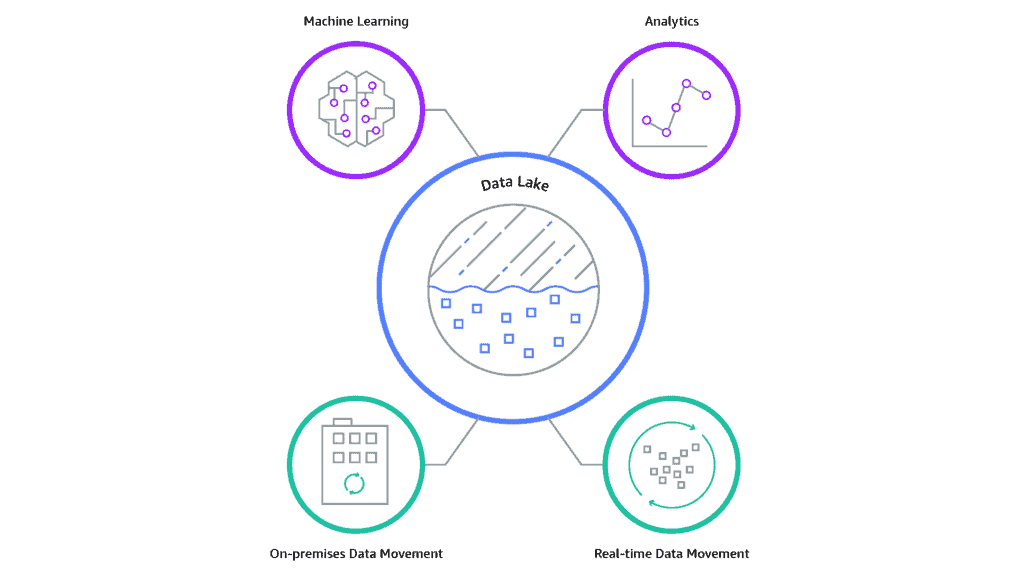
Azure Data Lake is a cloud-based storage and analytics service offered by Microsoft Azure. It is designed to handle big data processing, storage, and management for enterprise-level applications. Azure Data Lake consists of two main components: Azure Data Lake Storage and Azure Data Lake Analytics.
Azure Data Lake Storage is a highly scalable and secure data repository that allows organizations to store and analyze petabytes of data. It supports various data types such as structured, semi-structured, and unstructured data.
Azure Data Lake Analytics is a powerful analytics service that enables organizations to perform big data processing and analysis without the need for complex infrastructure or specialized hardware.
It supports both batch and interactive processing and provides an easy-to-use interface for writing and executing complex queries. Azure Data Lake Analytics integrates seamlessly with other Azure services and provides a unified experience for data processing and analysis.
Azure Data Lake is an ideal solution for organizations that deal with large volumes of data and require a scalable and cost-effective platform for processing, storing, and managing their data. It can be used for a wide range of applications such as data warehousing, machine learning, IoT, and real-time analytics.
In today’s data-driven world, organizations need to process and analyze large volumes of data to gain insights and make informed decisions.
Azure Data Lake is an essential tool for data analytics because it provides a scalable and cost-effective platform for storing, processing, and managing big data.
Scalability: Azure Data Lake is designed to handle petabytes of data, making it an ideal platform for organizations that deal with large volumes of data.
Cost-effective: Azure Data Lake is a cost-effective solution for data analytics because it allows organizations to pay only for the resources they use.
Integration: Azure Data Lake integrates seamlessly with other Azure services, making it easy to build end-to-end data analytics solutions.
Security: Azure Data Lake provides enterprise-grade security features, ensuring data privacy and protection.
Real-time analytics: Azure Data Lake supports real-time analytics, allowing organizations to gain insights from their data in real-time.
Machine learning: Azure Data Lake supports machine learning, allowing organizations to build predictive models and gain insights from their data.
Types of Azure Data Lake Service
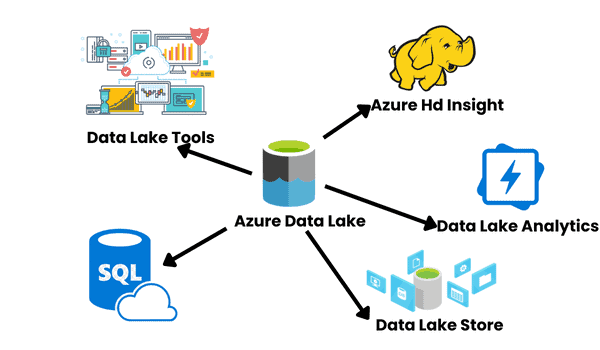
Azure Data Lake is a cloud-based data storage and analytics platform offered by Microsoft Azure. It provides a range of services to store, process, and analyze large amounts of data. There are two types of Azure Data Lake services, which are:
Azure Data Lake Storage Gen1:
Azure Data Lake Storage Gen1 is a highly scalable and secure data storage service for big data analytics. It provides a single repository for large amounts of structured, semi-structured, and unstructured data.
The service supports Hadoop Distributed File System (HDFS) and can be accessed through REST APIs or Hadoop-compatible file system APIs. It also provides features like tiered storage, data encryption, and access control.
Azure Data Lake Storage Gen2:
Azure Data Lake Storage Gen2 is the latest version of Azure Data Lake Storage. It is a scalable and cost-effective cloud-based storage service that provides a hierarchical namespace and supports both object and file storage.
It is designed to handle big data workloads and provides features like unlimited storage capacity, high throughput, and low latency.
It also supports Azure Blob storage APIs, which enables seamless data movement between Azure Blob storage and Azure Data Lake Storage Gen2.
Azure Data Lake Architecture
The architecture of Azure Data Lake consists of three main components, which are:
- Data Ingestion:Data Ingestion is the process of bringing data from various sources into Azure Data Lake. Azure Data Lake supports various data ingestion methods like Azure Data Factory, Azure Event Hubs, Azure Stream Analytics, and more.
These methods enable users to ingest data from a variety of sources like on-premises data centers, IoT devices, social media, and other cloud-based services.
- Data Storage:Data Storage is the component that stores the ingested data in Azure Data Lake. Azure Data Lake provides two types of storage services, which are Azure Data Lake Storage Gen1 and Gen2.
Azure Data Lake Storage Gen1 is a highly scalable and secure data storage service for big data analytics. It provides a single repository for large amounts of structured, semi-structured, and unstructured data.
Azure Data Lake Storage Gen2 is the latest version of Azure Data Lake Storage, which provides a hierarchical namespace and supports both object and file storage.
- Data Analytics:Data Analytics is the component that enables users to run analytics jobs over the data stored in Azure Data Lake. Azure Data Lake provides various data analytics services like Azure Data Lake Analytics and Azure Stream Analytics.
Azure Data Lake Analytics is a distributed analytics service that enables users to run big data analytics jobs over large amounts of data stored in Azure Data Lake Storage Gen1 or Gen2.
Azure Stream Analytics is a real-time data processing service that enables users to process and analyze streaming data from various sources.
In addition to these three main components, Azure Data Lake also provides various other services like Azure Data Catalog, Azure HDInsight, and more. Azure Data Lake Catalog is a metadata management service that enables users to discover, understand, and consume data assets stored in Azure Data Lake.
Azure HDInsight is a fully managed cloud-based service that provides popular big data frameworks like Hadoop, Spark, and HBase.
What is the Azure Data Lake Certification?
The Azure Data Lake Certification is a Microsoft certification program designed to validate the skills and knowledge required for designing, implementing, and managing Azure Data Lake solutions.
It is intended for professionals who work in the field of big data and analytics and want to demonstrate their expertise in working with Azure Data Lake.
Getting certified in Azure Data Lake can help you in:
Demonstrating expertise: The certification validates the candidate’s skills and knowledge in working with Azure Data Lake, providing a competitive edge in the job market.
Career advancement: The certification can lead to career advancement opportunities, such as promotions and salary increases.
Industry recognition: The certification is recognized by the industry as a standard for validating skills in working with Azure Data Lake.
Access to community: The certification provides access to a community of certified professionals and experts, allowing candidates to network and learn from others in the field.
Azure Data Lake Certifications Offered by Microsoft
Microsoft offers a variety of certifications related to Azure Data Lake, which are designed to validate your skills and knowledge in using Azure Data Lake as an environment for storing, processing, and analyzing big data.
Data certifications offered by Microsoft for Azure Data Lake include:
Azure Data Engineer Associate :
Azure AI Engineer Associate
Data Analyst Associate
Azure Solutions Architect Expert
PreRequisites for Azure Data Lake Certification
- Basic understanding of data analytics concepts and techniques.
- Familiarity with the Azure platform and services.
- Experience with SQL and other programming languages.
- Knowledge of data storage and processing concepts.
- Understanding of data security and compliance.
Azure Data Lake Certification exam Format
The Azure Data Lake certification exams offered by Microsoft are computer-based, proctored exams that are delivered through Pearson VUE.
The format of the exam varies depending on the specific certification, but most exams consist of multiple choice questions and case studies that test the candidate’s knowledge of Azure Data Lake solutions and related technologies.
The exams are timed, with the duration varying from 120-180 minutes depending on the certification.
Candidates are required to answer a set number of questions within the allotted time and must achieve a passing score to earn the certification.
Some exams may also include performance-based questions that require candidates to perform real-world tasks using Azure technologies in a simulated environment.
These questions test the candidate’s ability to apply their knowledge and skills to solve practical problems and are designed to assess the candidate’s ability to perform the job role associated with the certification.
What are the topics covered in the Azure Data Lake Certification exam?
The topics covered in the Azure Data Lake Certification exam will be different for each certification.
However, here are some common topics that are typically covered in the exam:
- Understanding Azure Data Lake and its architecture
- Designing and implementing Azure Data Lake storage solutions
- Implementing Azure Data Lake processing solutions
- Working with Azure Data Lake analytics tools and techniques
- Securing and monitoring Azure Data Lake solutions
- Designing and implementing data integration solutions
- Managing and optimizing Azure Data Lake solutions
Benefits of Azure Data Lake
Storage: Data Lake Storage is a highly scalable, cloud-native storage service that makes it easy to store and access your unstructured data in its native format.
Self-service data management: With Azure Data Lake, you have the benefit of self-service data management. You can easily create multiple data lakes and configure them with appropriate permissions.
Security: Azure Data Lake provides you with tools to secure your data lake, including encryption at rest and in motion.
Flexibility: You have the flexibility to store and analyze any type of data in its native format using Azure Data Lake. This allows you to perform offline analytics, like machine learning, without having to transform your data.
Scalability: Azure Data Lake is designed to scale up or down as needed, so you can easily add new nodes when there’s more demand or remove them when they are no longer needed.
Data analytics: With Azure Data Lake, you can perform data analytics using tools like Apache Hive, Apache Spark, and R. You can also use pre-built Big Data services like HDInsight to build data lakes on Hadoop.
Ease of use: Azure Data Lake makes it easy for anyone with a basic understanding of SQL Server to access unstructured data in its native format.
Hybrid cloud integration: You can use Azure Data Lake to store data on-premises and in the cloud. This allows you to process data where it’s stored, which reduces latency and provides security benefits.
Cloud App Security: Cloud App Security (CAS) is a cloud-based service that provides visibility and control over your SaaS applications. It allows you to monitor and audit user activities in SaaS apps, including Office 365, Salesforce1, Google G Suite, and many others.
Working of Azure Data Lake
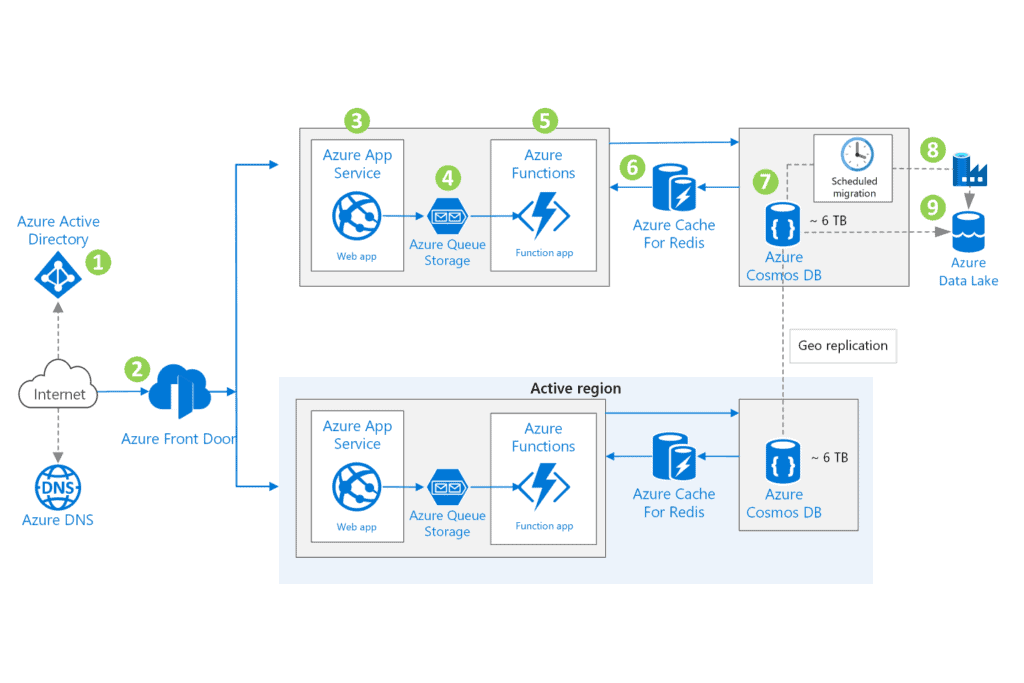
Now let us see how Azure Data Lake works. Azure Data Lake is a fully managed cloud storage service that provides you with access to big data processing frameworks and services such as Apache Spark, Apache Kafka, and Hadoop.
- You upload your data to Azure Data Lake Store (ADLS) using a service like Azure Data Factory or Copy/Sift.
- You can also use tools such as Apache Spark and Hadoop, which are available from the Azure Marketplace.
- The data is then processed by these frameworks via Apache Hive, Spark SQL, and other tool sets that are offered by the marketplace in their containers.
- It’s then ready for consumption by your applications and services via Azure Data Lake Analytics (ADLA) or Azure Data Lake Store (ADLS).
Who can use Azure Data Lake?
Azure Data Lake is for anyone who wants to do big data analytics. It has all kinds of customers, from large enterprises with internal data lakes to small companies that have never done any kind of data analytics before. Azure Data Lake is also good for people who want to get started with big data and don’t know where to begin.
Some of the industries Azure Data Lake is used in include:
Media and entertainment : Media and entertainment companies use Azure Data Lake to analyze their content, including movies, music, news stories, and social media posts. They can look at the trends in user behavior over time to determine what types of content people like best and how they respond to different types of messaging.
Insurance: Insurance companies need data lakes because they have lots of different products that they want to sell with different price points depending on the client’s needs. They also deal with a lot of customer data from claims reports that needs analysis.
Finance and Banking : Finance and banking companies use data lakes to look at user behavior to determine what types of products people like best. They also use it to analyze social media data, which can provide insight into consumer trends and opinions on products.
E-commerce and retail (especially fashion) : Online shops and fashion retailers use data lakes to make recommendations based on people’s shopping habits.
ADLS and Big Data Processing
By using ADLS and Big Data Processing companies can quickly get insights from their data lakes. They can use this information to make better business decisions and provide a better user experience.
ADLS helps companies store, process and deliver their data in real-time from anywhere without any transformation. It also allows them to analyze their data in any format without the need for programming skills.
Azure Data Lake Store Security
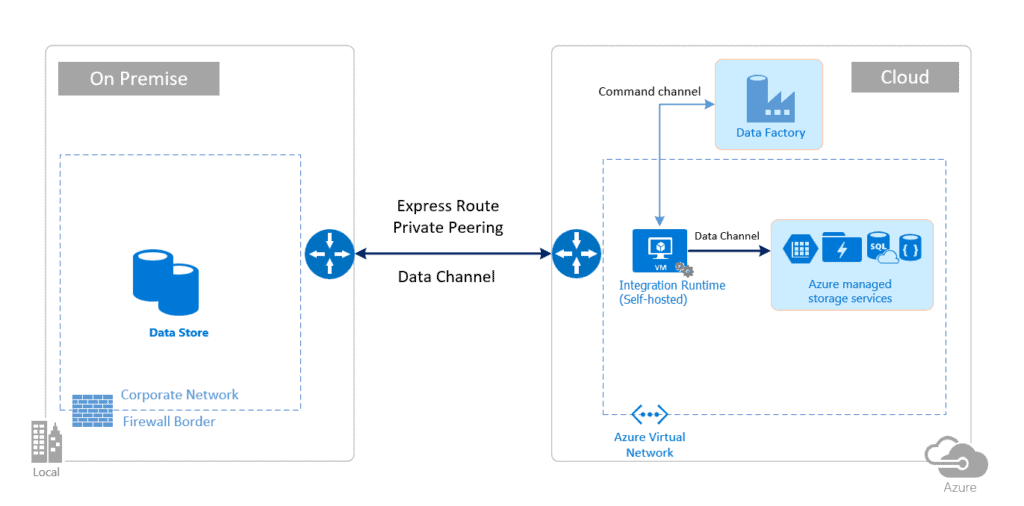
Azure Data Lake Store Security is a built-in feature that provides easy-to-use encryption, decryption, and auditing capabilities for your data lake.
It helps you protect your data at rest, in motion, and use. With Azure Data Lake Store Security, you can easily control who has access to your data by providing fine-grained authorization for users and groups.
Encryption: Encrypt all data at rest in the cloud -Audit every user’s activity on your Azure Data Lake Store account
Auditing: Auditing is a built-in feature that provides easy-to-use encryption, decryption, and auditing capabilities for your data lake.
Features of Azure Data Lake
Flexible Storage Options: This provides you with the flexibility to choose from different storage options based on your needs. It also supports a wide range of file formats including CSV, JSON, Avro, Parquet, etc.
Unified Data and Compute Experience: This toolkit provides you with a unified data and compute experience that enables you to store, process, and analyze all your data. It also helps in performing real-time analytics on streaming data.
Advanced Analytics: This toolkit provides you with advanced analytics capabilities, including machine learning, stream processing, and data visualization.
Easy and Scalable: Azure Data Lake provides you with an easy, scalable, and cost-effective solution to store your data. It also helps in performing real-time analytics on streaming data.
Integrated Security: The data lake toolkit is integrated with open-source security tools like Apache Ranger and Apache Sentry, which help in controlling access to sensitive data.
Easy Integration with Other Azure Services: You can easily integrate this toolkit with other Azure services such as HDInsight, Machine Learning Studio, Power BI, etc.
Easy to Monitor and Manage: You can easily monitor and manage the performance of your data lake with the Azure Data Lake Analytics portal, which is a web-based monitoring tool.
Azure Data Lake Certification
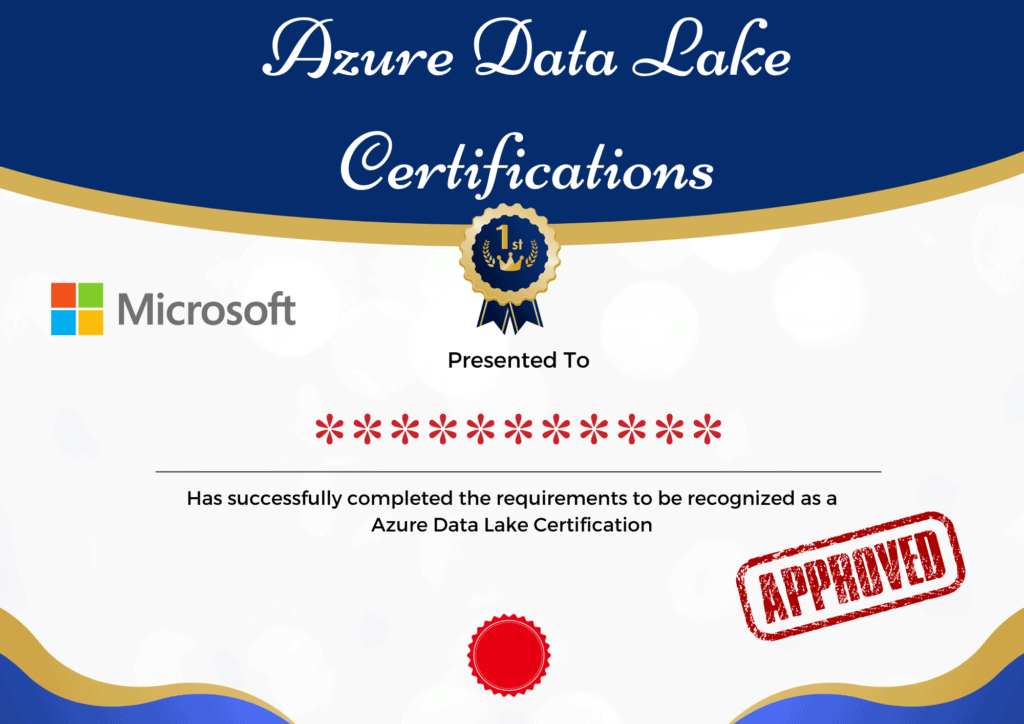
The Azure Data Lake Certification is a Microsoft certification program designed to validate the skills and knowledge required for designing, implementing, and managing Azure Data Lake solutions.
It is intended for professionals who work in the field of big data and analytics and want to demonstrate their expertise in working with Azure Data Lake.
Cost of Certification
The cost of the Azure Data Lake certification varies depending on the specific certification path and the location of the exam. The price of the certification exam is typically between $99 USD and $165 USD per attempt.
The fees for certification exams may also include study materials and courses. The cost of these will vary depending on the provider, but you can expect to pay a somewhat high price.
Getting certified in Azure Data Lake can help you in:
- Demonstrating expertise: The certification validates the candidate’s skills and knowledge in working with Azure Data Lake, providing a competitive edge in the job market.
- Career advancement: The certification can lead to career advancement opportunities, such as promotions and salary increases.
- Industry recognition: The certification is recognized by the industry as a standard for validating skills in working with Azure Data Lake.
- Access to community: The certification provides access to a community of certified professionals and experts, allowing candidates to network and learn from others in the field.
Azure Data Lake Certifications Offered by Microsoft
Microsoft offers a variety of certifications related to Azure Data Lake, which are designed to validate your skills and knowledge in using Azure Data Lake as an environment for storing, processing, and analyzing big data.
Data certifications offered by Microsoft for Azure Data Lake include:
Azure Data Engineer Associate :
Azure AI Engineer Associate
Data Analyst Associate
Azure Solutions Architect Expert
PreRequisites for Azure Data Lake Certification
- Basic understanding of data analytics concepts and techniques.
- Familiarity with the Azure platform and services.
- Experience with SQL and other programming languages.
- Knowledge of data storage and processing concepts.
- Understanding of data security and compliance.
Prerequisites for Azure Data Lake Certification
- Basic understanding of data analytics concepts and techniques.
- Familiarity with the Azure platform and services.
- Experience with SQL and other programming languages.
- Knowledge of data storage and processing concepts.
- Understanding of data security and compliance.
Azure Data Lake Certification Exam Format
The Azure Data Lake certification exams offered by Microsoft are computer-based, proctored exams that are delivered through Pearson VUE.
The format of the exam varies depending on the specific certification, but most exams consist of multiple choice questions and case studies that test the candidate’s knowledge of Azure Data Lake solutions and related technologies.
The exams are timed, with the duration varying from 120-180 minutes depending on the certification.
Candidates are required to answer a set number of questions within the allotted time and must achieve a passing score to earn the certification.
Some exams may also include performance-based questions that require candidates to perform real-world tasks using Azure technologies in a simulated environment.
These questions test the candidate’s ability to apply their knowledge and skills to solve practical problems and are designed to assess the candidate’s ability to perform the job role associated with the certification.
What are the topics covered in the Azure Data Lake Certification exam?
The topics covered in the Azure Data Lake Certification exam will be different for each certification.
However, here are some common topics that are typically covered in the exam:
- Understanding Azure Data Lake and its architecture
- Designing and implementing Azure Data Lake storage solutions
- Implementing Azure Data Lake processing solutions
- Working with Azure Data Lake analytics tools and techniques
- Securing and monitoring Azure Data Lake solutions
- Designing and implementing data integration solutions
- Managing and optimizing Azure Data Lake solutions
Job Opportunities after Clearing Azure Data Lake Certification
Clearing an Azure Data Lake certification can lead to a variety of job opportunities in the field of data engineering, data analysis, and cloud computing. Some of the job roles that require or benefit from Azure Data Lake certification include:
- Data Engineer: A data engineer is responsible for designing, building, and maintaining data pipelines and data processing systems.
- Data Analyst: A data analyst is responsible for analyzing large datasets to identify trends and insights that can be used to inform business decisions.
- Cloud Engineer: A cloud engineer is responsible for designing and implementing cloud-based solutions using cloud technologies such as Azure.
- Business Intelligence Developer: A business intelligence developer is responsible for designing and implementing business intelligence solutions that enable organizations to make data-driven decisions.
- Solution Architect: A solution architect is responsible for designing and implementing technology solutions that meet business requirements.
Conclusion
In conclusion, obtaining an Azure Data Lake certification can be a valuable investment for data professionals who want to demonstrate their expertise in using Azure services. With the rapid growth of big data and cloud computing, Azure Data Lake has become a critical tool for managing and analyzing large amounts of data in the cloud.
By obtaining an Azure Data Lake certification, professionals can demonstrate their skills and knowledge in using this powerful tool to meet business needs.
In addition to the benefits of demonstrating expertise in Azure Data Lake, obtaining a certification can also lead to increased job opportunities and higher salaries.
Employers are often looking for candidates with specific knowledge and skills in cloud computing and big data, and an Azure Data Lake certification can be a way to stand out from other candidates.
Overall, while there are costs involved in obtaining an Azure Data Lake certification, the benefits can be significant. By investing in the right preparation and resources, data professionals can demonstrate their expertise in using Azure Data Lake and position themselves for success in a rapidly growing field.
Frequently Asked Questions
The cost of each exam is $165 USD.
The exams typically consist of 40-60 questions.
You have 120-180 minutes (2.5 hours) to complete each exam.
The certification is valid for two years from the date you pass the exam.
You Can enroll in our Azure Certification prep course to prepare for the exams.
The certification demonstrates your expertise in implementing and designing data solutions using Azure services. It can help you advance your career, increase your earning potential, and gain recognition from peers and employers.
